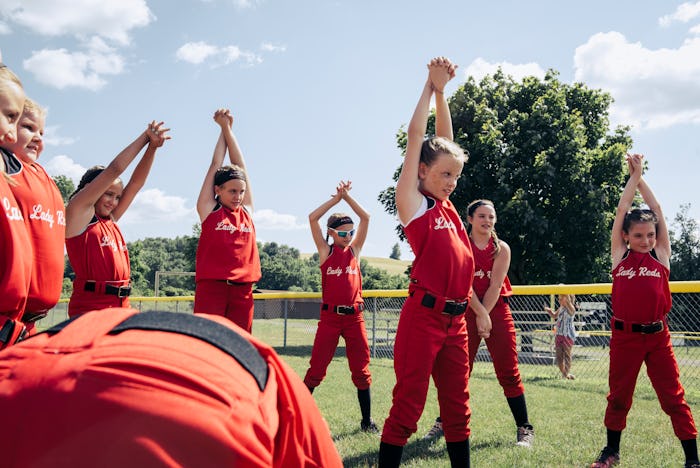Life

How My Kid's Hobbies Are Teaching Me To Be A Better Mom
As I sit quietly, watching my daughter diligently practice her toe-taps atop the surface of the soccer ball, I relax into the meditative movement of it, even though I'm not the one in the cleats. That slow concentration is just one example of what my kid's hobbies are teaching me, because it turns out I have as much to learn from my children as they do from their parents.
I love watching my daughter concentrate on her body, learning its churns and rhythms in a way I never could at her age. She puts herself into every motion on the pitch and in the training field, and it's stunning to watch. She and her teammates are so laser-focused on everything they need to do and how they need to work together that the rest of the world falls away. Learning to be in touch with yourself and your team is not a lesson I thought I'd learn from my 8-year-old, but here we are. And it's kind of awesome.
Growing up, I was a swimmer. My ADHD liked the fast-moving nature of the sport. Whether I was competing as a junior (and then senior) lifeguard at the lifeguard open, or I was racing laps and diving for fun, it was my joy. Swimming was all about the snippets. Maximum concentration for a minimum amount of time. Soccer and softball (my daughter's sports of choice) require long periods of quiet, and a ton of teamwork. The long waves of back and forth, and periods of wait, are so foreign to me. There is a whole series of calls and cues that you miss if you're not a player. The language of her sports are such that she and her teammates can guide and praise one another with nothing more than a nod or a gesture.
Her sports have taught me a great deal about active listening and small movements. That's because, on the pitch, subtlety is a strength. A simple chin jut or a hand twisting might mean that another team member has a clear shot, or a brief head nod might mean "Yes, you nailed it, the defense is ready." Participatory observation and listening, I've learned, has its uses off the pitch as well. Think about giving group presentations, or even canvassing for signatures. Actively listening, with small gestures and sounds of understanding, could mean the difference between getting that signature, or being left in the cold. Beyond that, it helps people feel heard because you are showing them that you are truly engaging with what they're saying, and that's a big deal.
There are occasions where what I learn is far from anything subtle. One important thing my kid's hobby is teaching me is to be the squeaky wheel. In soccer, if you're drawing a foul, you need to do it with your whole body, huge and mighty to draw the attention of the referee. (You've probably seen this done in a World Cup game, and laughed, thinking to yourself "they barely got tapped, why are they flailing about like that?") But there's a reason. The pitch is 120 meters long and 90 meters wide. There are usually only between 2 and 4 referees on that whole pitch at any given time, plus 22 players. If you don't make a huge ruckus, you aren't getting noticed, the game doesn't stop, and you don't get the benefit of that foul (be it in the form of a penalty or just extra time on that play clock).
I am by no means a passive person, but I also don't seek out confrontation, even when it is warranted. This isn't a trait I want to model for my children, and it's not how I want to live. Watching my daughter throw herself onto the ground yelling "yellow card," has helped me learn that even if I'm not "drawing a foul," if I just need to be seen, feel seen, I need to be the one to make myself heard, and to let the others know that I am not afraid of making a scene in order to get what needs done, done. It's pretty liberating, in all honesty. Maybe I could even get a cool uniform.